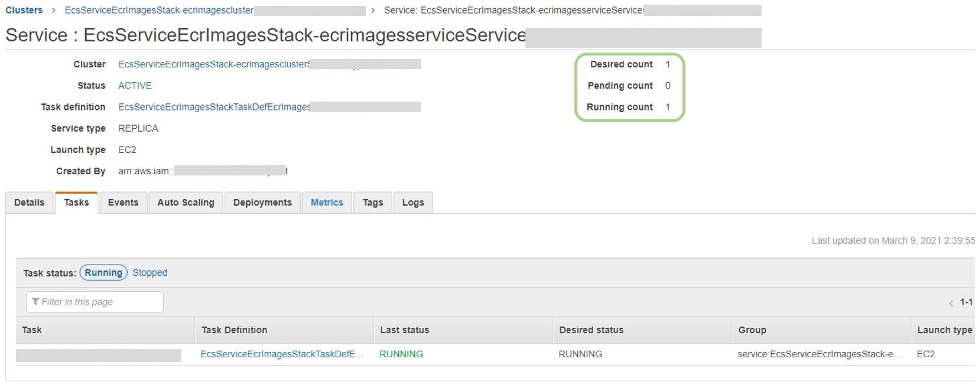Containers
Category: Amazon Elastic Container Service
Compliance as Code for Amazon ECS using Open Policy Agent, Amazon EventBridge, and AWS Lambda
Customers are looking for ways to implement best practices/policies that enforce security and ongoing compliance. These best practices apply to workloads running on Amazon Elastic Container Service (Amazon ECS). Nowadays, policies can be expressed as code and evaluated before workloads are deployed. This enables you to consistently enforce best practices and prevent workloads that violate […]
Automated software delivery using Docker Compose and Amazon ECS
Note: Docker Compose’s integration with Amazon ECS has been deprecated and is retiring in November 2023 In November 2020, Docker Compose for Amazon ECS became generally available. It is now even easier for a developer to take a containerized microservices-based application from their workstation and deploy it straight to the AWS Cloud. Developers can now run […]
Building container images on Amazon ECS on AWS Fargate
Note: The Kaniko project has been archived and is not actively maintained. Building container images is the process of packaging an application’s code, libraries, and dependencies into reusable file systems. Developers create a Dockerfile alongside their code that contains all the commands to assemble a container image. This Dockerfile is then used to produce a […]
Managing compute for Amazon ECS clusters with capacity providers.
Customers running containers are often challenged with having to manage and understand how to run and scale the compute for their clusters. For customers taking advantage of Amazon Elastic Container Service (Amazon ECS) on AWS Fargate, the burden is lifted as the underlying compute layer is fully managed by AWS, enabling the customer to focus […]
How Vanguard uses AWS X-Ray and Amazon CloudWatch to improve observability for Amazon ECS cloud applications
This post was contributed by Jeffrey Emberger, Technical Lead, The Vanguard Group and John Formento, Solutions Architect, AWS. Cloud applications are changing the speed at which companies can deliver new capabilities for their customers. With increased speed comes the need to more quickly, reliably, and inexpensively observe cloud application health. Observability is no longer an […]
Graceful shutdowns with ECS
February 2023: Parts of this blog are no longer accurate. Following enhancements to the ELB integration for ECS services, tasks running on Fargate Spot will be deregistered from a target group if it receives a spot termination notice before a SIGTERM is issued to the Task. Introduction Amazon Elastic Container Service (Amazon ECS) gives customers […]
Amazon ECS-optimized Amazon Linux AMI End-of-Life
Update June 25, 2025 – The ECS-optimized Amazon Linux AMI (also called Amazon Linux 1) will reach its end of life on September 15, 2025. We encourage customers to upgrade their applications to use Amazon Linux 2023, which includes long term support through 2028. Since its launch in 2015, the Amazon ECS-optimized Amazon Linux AMI has […]
NEW – Using Amazon ECS Exec to access your containers on AWS Fargate and Amazon EC2
Today, we are announcing the ability for all Amazon ECS users including developers and operators to “exec” into a container running inside a task deployed on either Amazon EC2 or AWS Fargate. This new functionality, dubbed ECS Exec, allows users to either run an interactive shell or a single command against a container. This was one of […]
Autoscaling Amazon ECS services based on custom CloudWatch and Prometheus metrics
Introduction Horizontal scalability is a critical aspect of cloud native applications. Microservices deployed to Amazon ECS leverage the Application Auto Scaling service to automatically scale based on observed metrics data. Amazon ECS measures service utilization based on CPU and memory resources consumed by the tasks that belong to a service and publishes CloudWatch metrics, namely, […]
Theoretical cost optimization by Amazon ECS launch type: Fargate vs EC2
This post was contributed by Julia Beck, Thomas Le Moullec, Kevin Polossat, and Sam Sanders Customers often ask about best practices when using Amazon Elastic Container Service (Amazon ECS), in particular around the Well-Architected Framework pillar of Cost Optimization. Within this, choosing between the two different launch types, EC2 and Fargate, may be one of […]








